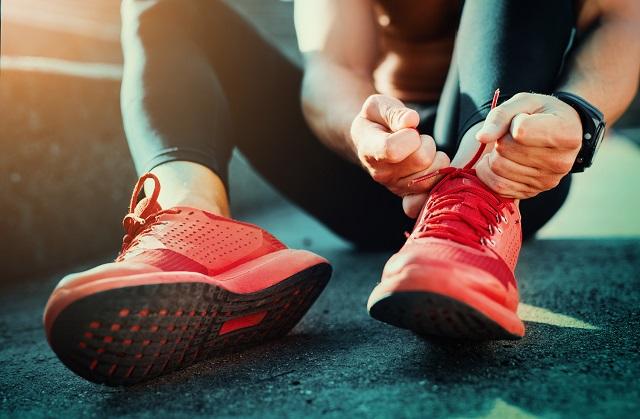Photo: ShotShare / Getty Images
I started writing on the theme of weight management for marathon runners."The lighter in a marathon, the better the time comes out."However, there is a limit.What is the proper weight for runners?A guide is the BMI index.I think many people have seen it for a company health checkup, but they are guided by the following formula.
BMI = Weight (kg) ÷ {height (m) × height (m)}
There are various automatic calculation sites on the net, so if you have trouble calculation, you should use it.For example, using this site to my height 174cm, weighing 69.When you enter 0kg, First, the representative of the slimming (Soshin) is Yuta Shitara (Honda), a full marathon Japanese record holder.He is 170cm tall and weighs 48kg, so BMI is 16.6.In the judgment criteria (adult) of the World Health Organization (WHO), BMI16 is less than thin, so Shitara is just barely.On the other hand, Yuki Kawauchi, who won the Boston Marathon this year and declared a professional conversion, is a representative of a tight physique, and weighs 62kg for 172cm tall, so BMI is 20..It was 9.As far as I looked up, the top runners in Japan were mostly in this range (BMI16-21), both boys and girls.BMI, which is the standard for the standard weight of the general public, is 22, so many top runners are thinner. 18 in the obesity criterion above.Less 5 to 25 enters the category of "normal weight".If you are an amateur marathon runner, it is within that range, and if possible, it is desirable to have less numbers than "22".In my case, it is within the range of normal weight, but to make BMI22 or less, weighs more..I have to cut 5kg.This requires considerable effort. The BMI was very interesting survey data in Running Science (Kawade Shobo Shinsha) by John Blue War, a professor at the University of St. Mary's University, which was introduced earlier.According to it, the BMI of the international marathon runner is 18-22..5, 800m runner 18.5-24, 400m runner 20-25, 100m runner 20.It seems to be 5-27.The shorter the running distance, the greater the BMI value (weight).You can see how important "lightness" is for long -distance runners. Ivanko_brnjakovic / Getty Images BMI is an index derived from height and weight, but one of the other numbers that runners must not forget is body fat percentage.Body fat percentage is a percentage of the amount of fat accounting for weight, and with a home -use body fat meter (body composition meter) that uses the nature of "muscles are about 10 times more electricity of fat".Can be measured.According to the "body fat percentage judgment table" announced by a health equipment manufacturer on the website, 12%to 22%for men aged 40 to 59, and 22%to 35%for women.It is a fat percentage. So what is the ideal body fat percentage for marathon runners?It is easy to imagine that it is less than the standard person's standard value.In conclusion, there seems to be a difference depending on the runner level.According to a survey conducted by Tanita via a runnet, the average body fat percentage of Sub 3 (3 -hour full marathon) runner is male..6%, women 13.It was 5%.Men 14 when this becomes sub 4.4%, women 19.4%, Sub 5 male 17.2%, women 21.8%, the faster, the less body fat. In addition, the comparison table of the body fat percentage of "ordinary people", "citizen runners", and "elite runners" announced by the Yokohama City Sports Medical Science Center is quite interesting.This is extracted from the person who received the "sports program service" of the center, and according to the average body fat percentage of "ordinary people" (30s to 40s)..7%, female 25.While 6%, the average of "citizen runners" (same) is men 13.9%, woman 19.1%, "Elite Runner" (belonging to businessmen, 20s to 30s) is male 9.4%, women 16.It is 8%.This is said to be further compressed when it comes to Olympic -class players, as can be 5 to 8%for men and 8 to 10%for women. The conclusion derived from the above is the last repetition, but in order to improve running performance, it is all about how to reduce body fat efficiently. The only way to reduce the BMI value is to lose weight because the height of an adult person does not change significantly.However, if you try to reduce your weight rapidly due to dietary restrictions, there is a danger that your muscles will lose together.Diet books are often written that "one month losing one month is 2%to 3%of the month for healthy weight loss."This applies to runners.Both marathons and weight loss are most important in pace. Therefore, once the race to be aimed, we first grasp the current BMI (weight) and body fat percentage.Next, determine the target BMI and body fat percentage (how far to drop it), set the weight loss pace (○ kg per week, a day ○ kcal, etc.), and execute it quietly until the day of the race.It will be. By the way, I wrote the theory of weight management in the marathon twice, but next time it is the execution.Recently, I would like to introduce a "secret weapon" of weight management that is secretly popular among runners.looking forward to.
Let's efficiently reduce body fat!
REACTION
